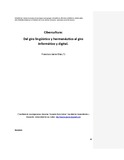| dc.rights.license | http://creativecommons.org/licenses/by-nc-sa/3.0/ve/ | es_VE |
| dc.contributor.author | Díaz, Francisco Javier | |
| dc.date.accessioned | 2018-12-06T21:47:35Z | |
| dc.date.available | 2018-12-06T21:47:35Z | |
| dc.date.issued | 2018-12-06 | |
| dc.identifier.issn | 0798-3069 | |
| dc.identifier.uri | http://www.saber.ula.ve/handle/123456789/45475 | |
| dc.description.abstract | Con Über den Humanismus (1946), Martín Heidegger inaugura, según Gianni Vattimo (1987), la
crisis del humanismo que constituirá una tradición desde mediados del siglo XX, un trance
irresoluble y que, en ese entonces, aún en el “giro hermenéutico” (del cual tampoco es que hemos
salido), sospecha de la técnica y sus frutos “maquínicos” y prevé una vaciedad peligrosa, al mismo
tiempo que una expansión arrolladora que en el siglo XXI, en los amaneceres del “giro informático
y digital”, se vive inexorablemente, para bien y para mal. La era digital y de la cibercultura son la
confluencia del tecnocientificismo con corrientes posthumanistas, posthistóricas, hiperpolíticas,
hipereconómicas e hipermasificadas, y una cotidiana y “viral” transformación y “estetización” de
las cosas y seres, de lo artificial y lo natural, lo material y lo espiritual, lo técnico, lo subjetivo
y cada vez más, lo biológico y corporal. Este (hiper)manuscrito pretende ser una reflexión sobre
tales cuestiones. | es_VE |
| dc.language.iso | es | es_VE |
| dc.rights | info:eu-repo/semantics/openAccess | es_VE |
| dc.subject | Humanismo | es_VE |
| dc.subject | Posthumanismo | es_VE |
| dc.subject | Giro hermenéutico | es_VE |
| dc.subject | Era digital | es_VE |
| dc.subject | Cibercultura | es_VE |
| dc.title | Del giro lingüístico y hermenéutico al giro informático y digital | es_VE |
| dc.type | info:eu-repo/semantics/article | es_VE |
| dc.description.abstract1 | With the book Über den Humanismus (1946), Martin Heidegger begins, according to Gianni
Vattinmo (1987), the humanism crisis that will constitute a tradition since the XX century’s first
half, an unresolved period which, at that time, even in the hermeneutic swift, he suspects of
technique and his “mechanical” achievements and predicts a dangerous emptiness, with an
overwhelming expansion that, in the twenty- first century, in the dawn of the digital era, we live
for better or worse. The digital era and the cyber-culture are the convergence of the
technoscientificism along with post-humanist, post-historical, hyper-political, hyper-economical and
overcrowded movements, and a daily and viral transformation and sterilization of things and
beings, from artificial and natural, material and spiritual, technical, subjective and increasingly
biological and corporeal aspects. This (hyper)manuscript pretends to be a reflection about such
matters. | es_VE |
| dc.description.colacion | 16-31 | es_VE |
| dc.description.email | franciscojavier@gmail.com | es_VE |
| dc.description.frecuencia | Cuatrimestral | |
| dc.identifier.depositolegal | pp1991102ME302 | |
| dc.publisher.ciudad | Mérida | |
| dc.publisher.pais | Venezuela | |
| dc.subject.institucion | Universidad de Los Andes | es_VE |
| dc.subject.keywords | Humanism | es_VE |
| dc.subject.keywords | Posthumanism | es_VE |
| dc.subject.keywords | Hermeneutic swift | es_VE |
| dc.subject.keywords | Digital era | es_VE |
| dc.subject.keywords | Cyber-culture | es_VE |
| dc.subject.seccion | Revista Fermentum: Artículos | es_VE |
| dc.subject.thematiccategory | Artes y Humanidades | es_VE |
| dc.subject.tipo | Artículos | es_VE |
| dc.type.media | Texto | es_VE |


